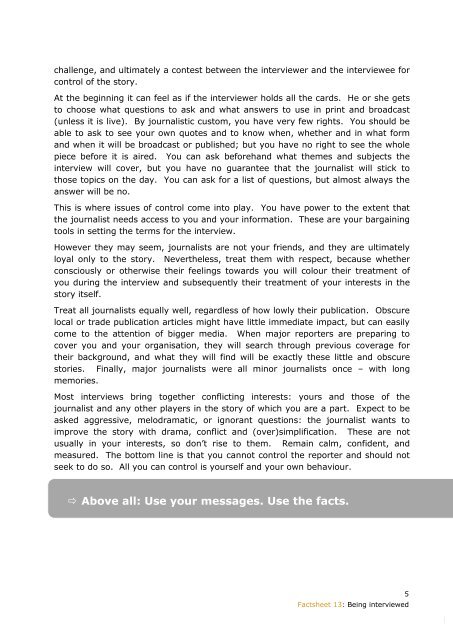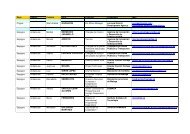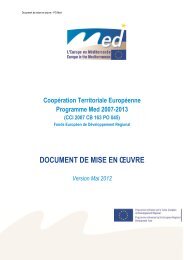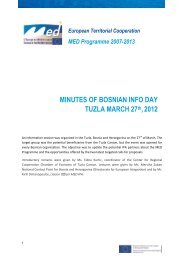MED Communication Handbook - Programme Med
MED Communication Handbook - Programme Med
MED Communication Handbook - Programme Med
Create successful ePaper yourself
Turn your PDF publications into a flip-book with our unique Google optimized e-Paper software.
challenge, and ultimately a contest between the interviewer and the interviewee for<br />
control of the story.<br />
At the beginning it can feel as if the interviewer holds all the cards. He or she gets<br />
to choose what questions to ask and what answers to use in print and broadcast<br />
(unless it is live). By journalistic custom, you have very few rights. You should be<br />
able to ask to see your own quotes and to know when, whether and in what form<br />
and when it will be broadcast or published; but you have no right to see the whole<br />
piece before it is aired. You can ask beforehand what themes and subjects the<br />
interview will cover, but you have no guarantee that the journalist will stick to<br />
those topics on the day. You can ask for a list of questions, but almost always the<br />
answer will be no.<br />
This is where issues of control come into play. You have power to the extent that<br />
the journalist needs access to you and your information. These are your bargaining<br />
tools in setting the terms for the interview.<br />
However they may seem, journalists are not your friends, and they are ultimately<br />
loyal only to the story. Nevertheless, treat them with respect, because whether<br />
consciously or otherwise their feelings towards you will colour their treatment of<br />
you during the interview and subsequently their treatment of your interests in the<br />
story itself.<br />
Treat all journalists equally well, regardless of how lowly their publication. Obscure<br />
local or trade publication articles might have little immediate impact, but can easily<br />
come to the attention of bigger media. When major reporters are preparing to<br />
cover you and your organisation, they will search through previous coverage for<br />
their background, and what they will find will be exactly these little and obscure<br />
stories. Finally, major journalists were all minor journalists once – with long<br />
memories.<br />
Most interviews bring together conflicting interests: yours and those of the<br />
journalist and any other players in the story of which you are a part. Expect to be<br />
asked aggressive, melodramatic, or ignorant questions: the journalist wants to<br />
improve the story with drama, conflict and (over)simplification. These are not<br />
usually in your interests, so don’t rise to them. Remain calm, confident, and<br />
measured. The bottom line is that you cannot control the reporter and should not<br />
seek to do so. All you can control is yourself and your own behaviour.<br />
� Above all: Use your messages. Use the facts.<br />
5<br />
Factsheet 13: Being interviewed<br />
�








